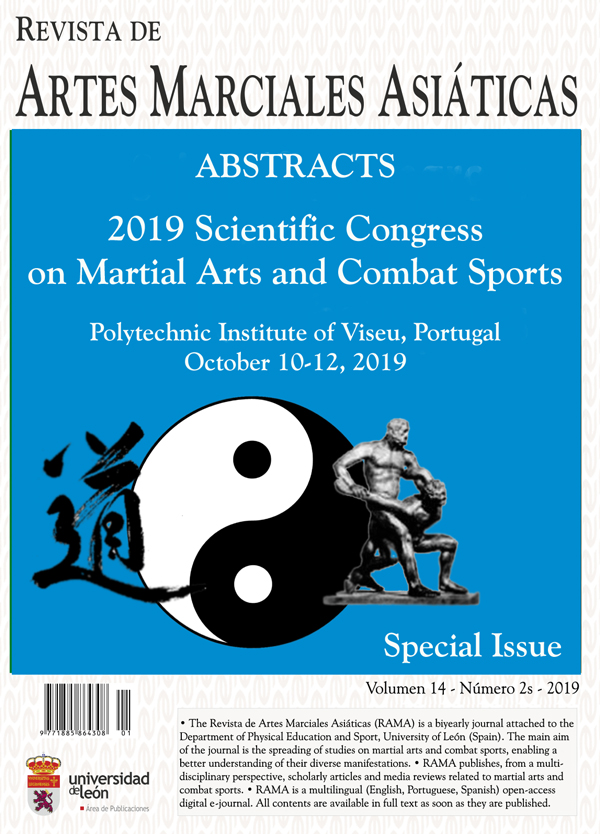Remarks on the philosophy of Idokan Karate
DOI:
https://doi.org/10.18002/rama.v14i2s.5975Palabras clave:
Martial arts, values, aims, karate, IdokanResumen
Every school of karatedo presents some special values and norms. May be, the philosophy of Idokan Karate is partially similar to other schools, and especially represents the Ido philosophy (that is not worldwide known). It is a real, practical philosophy, internalised and used by groups of karateka, as a form of today's warrior pathway. The author tries to answer the following questions: What ethics, values and rules are prominent in Idokan Karate? What is the specific, symbolic content of this style and school? This is a single case study, involving a content analysis of literature and the wider discourse, and the hermeneutic phenomenology. The study uses the analysis of broad discourse, which concerns both scientific studies and popularizing publications. Not without significance is the fact that the author has actively practiced Asian martial arts for over 40 years. The specific, symbolic content of Idokan Karate is taken from philosophic Taoism, Chinese and Japanese tradition of martial arts, and from Christianity. Its interpretation shows that the karate athlete has to go the moral way. It is the pathway toward being a better human. Such teleology comes from special values, rules and aims. In the normative ethics, the Decalogue and the idea of nobility (the Homo creator nobilis) are most important. Tao in Idokan Karate is understood as God's Word, the principle of love and the way of the Heavens.
Descargas
Métricas alternativas
Citas
Burrow, S. (2014). Martial arts and moral life. In G. Priest & D. Young (Eds.), Philosophy and the Martial Artse (pp. 50-67). London – New York: Routledge.
Cynarski, W.J. (2017). The philosophy of martial arts – the example of the concept of Ido. AUC Kinanthropologica, 53(2), 95–106. doi: https://doi.org/10.14712/23366052.2017.7
Cynarski, W.J. (2019). General canon of the philosophy of karate and taekwondo. Ido Movement for Culture. Journal of Martial Arts Anthropology, 19(3), 24-32. doi: https://doi.org/10.14589/ido.19.3.3
Johnson, J.A. (2017). From technique to way: an investigation into taekwondo’s pedagogical process. Ido Movement for Culture. Journal of Martial Arts Anthropology, 17(4), 3-13. doi: https://doi.org/10.14589/ido.17.4.2
Kim, D., & Back, A. (2000). The Way to Go: Philosophy in Martial Arts Practice. Seoul: Nanam.
Krippendorf, K. (2004). Content Analysis: An Introduction to Its Methodology. Thousand Oaks, CA: Sage.
Mayen, J., Johnson, J.A., & Mayen Bosch, R. (2015). Taekwondo as one’s life philosophy. The Journal of the International Association for Taekwondo Research 2(1), 24-29.
Sieber, L. (2001). Characteristics of Idokan karate. Ido – Ruch dla Kultury / Movement for Culture, 2, 26-27.
Skinner, J., Edwards, A., & Corbett, B. (2015). Research Methods for Sport Management. London - New York: Routledge.
Thiel, A., John, J., & Frahsa, A. (2019). Qualitative interviews in sport and physical activity research – do not forget the body. European Journal for Sport and Society, 16(1) 1-4. doi: https://doi.org/10.1080/16138171.2019.1616423
Tokarski, S. (1989). Sztuki walki. Ruchowe formy filozofii Wschodu. Szczecin: Glob.
Wyka, A. (1993). Badacz społeczny wobec doświadczenia. Warsaw: IFiS PAN.
Descargas
Publicado
Cómo citar
Número
Sección
Licencia
Derechos de autor 2019 Wojciech Cynarski

Esta obra está bajo una licencia internacional Creative Commons Atribución-NoComercial-CompartirIgual 4.0.
Los autores que publican en esta revista están de acuerdo con los siguientes términos:
- Los autores ceden de forma no exclusiva los derechos de explotación (reproducción, distribución, comunicación pública, transformación) a la Universidad de León, por lo que pueden establecer, por separado, acuerdos adicionales para la distribución no exclusiva de la versión de la obra publicada en la revista (por ejemplo, alojarlo en un repositorio institucional o publicarlo en un libro), con un reconocimiento de su publicación inicial en esta revista.
- Este trabajo se encuentra bajo la Creative Commons Attribution-NonCommercial-ShareAlike 4.0 International License. Puede consultarse desde aquí la versión informativa y el texto legal de la licencia.
- Se permite y se anima a los autores a difundir electrónicamente las versiones pre-print (versión antes de ser evaluada) y/o post-print (versión evaluada y aceptada para su publicación) de sus obras antes de su publicación, ya que favorece su circulación y difusión más temprana y con ello un posible aumento en su citación y alcance entre la comunidad académica.











